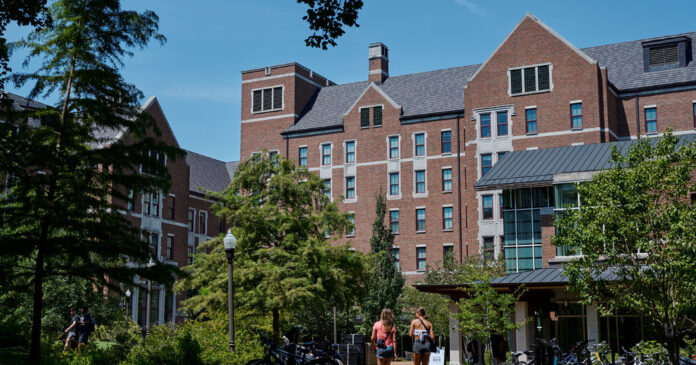As federal student loan payments come due for the first time in nearly four years, financially strapped borrowers may be worried about the consequences of missed payments.
Many student loan borrowers took on more debt during the payment pause, and their total monthly liabilities — even excluding their student loan bill — now exceed what they paid before March 2020, when payments were paused, according to an analysis by TransUnion, one of the three major credit reporting agencies .
“Adding the new payments to the mix will be a noticeable payments shock,” said Liz Pagel, senior vice president of consumer lending at TransUnion. “While many consumers have excess funds to make these payments, some may struggle.”
Fortunately, there are some protections for at-risk groups: Borrowers who don’t make their payments on time should see relatively little change in their credit score, at least for the year after repayment begins. And there’s a silver lining for those who are starting to pay down their debt again: Your credit score might be a little higher.
In normal times, missed payments on federal student loans are reported to the three major credit bureaus after 90 days of nonpayment. But through September 30, 2024, the Biden administration has relaxed the rules: missed payments will not be reported to the credit bureaus as delinquency, and borrowers will not be considered delinquent. Instead, missed payments are reported as forbearance and all missed payments are tacked on to the end of the loan term.
However, interest on missed payments will typically still accrue and the loan balance will not decrease, but may even increase. For this reason, skipping payments can still place a slight dent on your credit score, but the exact impact will depend on your circumstances.
The most devastating consequences won’t come until next year — and will only affect borrowers who continue to miss payments after the Biden administration’s years-long “run-in” period ends.
“This is pretty good news for borrowers because those who are able to start repaying now will see a positive impact,” said Rikard Bandebo, executive vice president and chief product officer at credit scoring company VantageScore, “and those who don’t.” However, I have the means to begin repayment and have about a year to plan.”
So what will show up on your credit report if you miss payments in the coming months? Two of the largest score creators, FICO and VantageScore, use a handful of data categories to generate their three-digit scores, which range from 300 to 850; Scores of at least 670 on FICO and 661 on VantageScore are considered “good”.
For both score builders, the most important category is your payment history (which makes up 35 percent of your FICO score), followed by the amount of total debt you have (30 percent of your FICO score). Missed payments can significantly impact your score, but forbearance will not be viewed negatively.
“As long as the student loan is reported without delinquency during this ramp-up period, the payment history dimension of the FICO Score calculation will not be negatively impacted,” said Ethan Dornhelm, vice president of scores and predictive analytics at FICO.
However, FICO scores also take into account the amounts that borrowers pay back on installment loans. A declining balance can help improve your score, but the opposite can hurt.
“In a scenario where the loan is not repaid and interest accrues, reporting the increasing outstanding balance of this loan to the credit reporting agencies could result in a slight negative impact on the rating,” Mr. Dornhelm said.
Most missed payments will incur interest. If that happens, the borrower’s next payment will be applied first toward the accrued interest until the interest is paid off, said Scott Buchanan, executive director of the Student Loan Servicing Alliance, an industry group. In some cases the monthly bill may increase. (Borrowers in income-driven repayment plans who miss their payments typically will not see an increase in their monthly liabilities because their payments are based on income and family size.)
Where to find your credit reports and credit reports
Borrowers who miss payments should monitor their credit reports and scores to make sure everything is being reported correctly – mistakes happen, and these types can be costly. For example, a lower credit score may translate into a higher interest rate on your car loan, or lenders may choose to deny you the loan altogether.
If you believe a missed student loan payment was not properly recorded, contact your loan servicer and let them know. You can also file a dispute with the credit bureau – Experian, Equifax or TransUnion – that contains the incorrect information on your report to have the problem resolved.
All consumers can receive a free copy of each of their three credit reports each week via AnnualCreditReport.com or by calling 877-322-8228.
VantageScore and FICO make their scores available for free through financial institutions and other providers.
Borrowers who are struggling to make their payments should explore their options, particularly income-driven repayment plans where payments are based on income and family size. The newest income-driven program, SAVE, is expected to generate the lowest payments for most borrowers and can be as low as $0 for those with lower incomes.
Starting October next year, borrowers who miss payments will be reported as delinquent three months later (so, in practical terms, borrowers will have some time to catch up if they are a month or two behind). But at this point, a missed bill can significantly impact your credit score. With VantageScore, it can cost up to 80 points, which “may affect your ability to receive a particular product or affect the price or amount of credit to which you are entitled,” Mr. Bandebo said.
“It’s better to be proactive,” he added, “and take advantage of all the programs available.”















